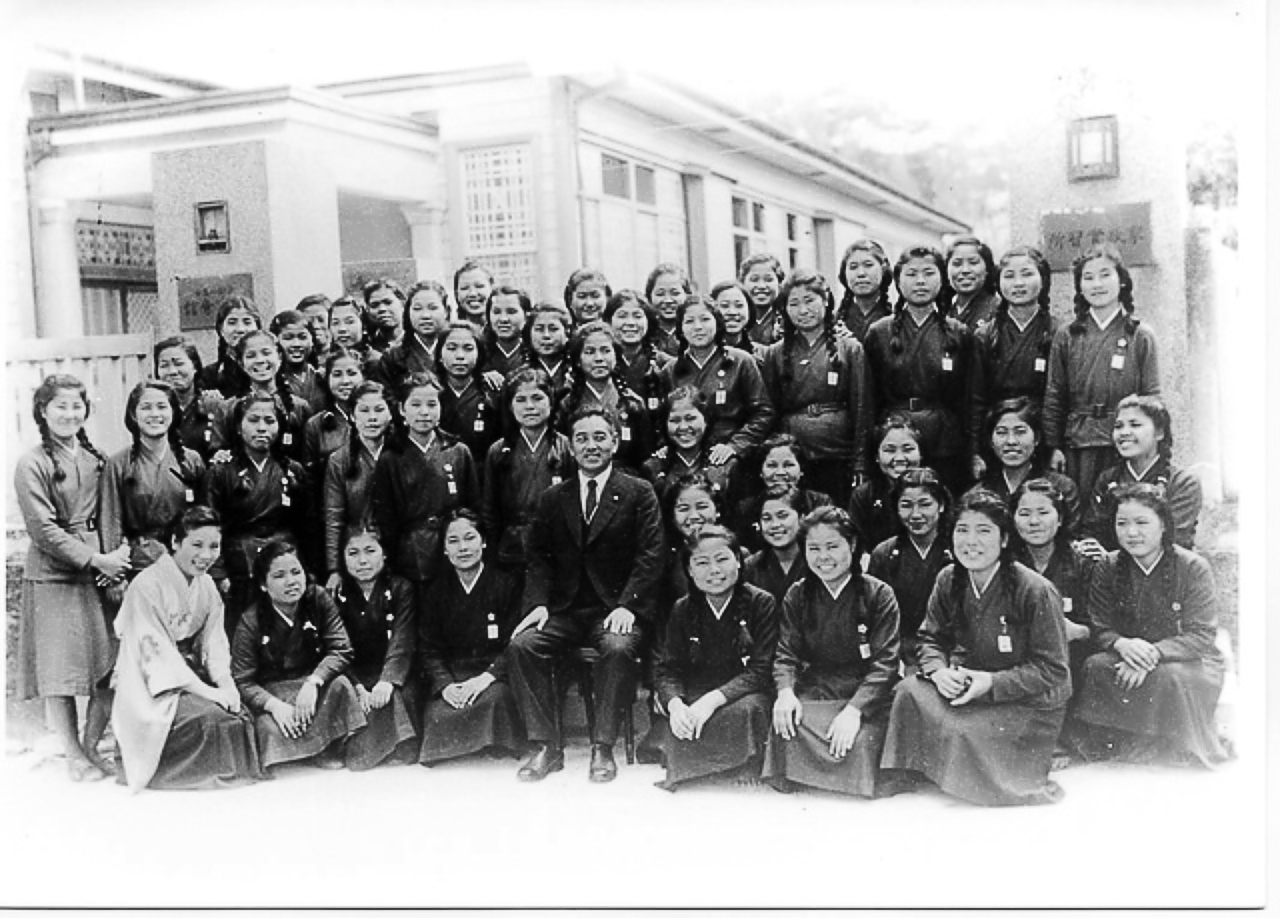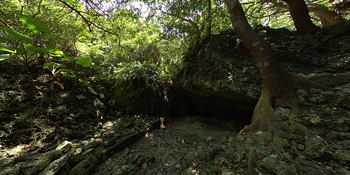Himeyuri students on:
[Wikipedia]
[Google]
[Amazon]
 The , sometimes called "Lily Corps" in English, was a group of 222 students and 18 teachers of the Okinawa Daiichi Women's High School and Okinawa Shihan Women's School formed into a nursing unit for the Imperial Japanese Army during the
The , sometimes called "Lily Corps" in English, was a group of 222 students and 18 teachers of the Okinawa Daiichi Women's High School and Okinawa Shihan Women's School formed into a nursing unit for the Imperial Japanese Army during the
 Up until the Himeyuri unit was dissolved, only 19 students had been killed. On June 18, 1945, a rough dissolution order was given to the unit. Told simply to "go home" amidst
Up until the Himeyuri unit was dissolved, only 19 students had been killed. On June 18, 1945, a rough dissolution order was given to the unit. Told simply to "go home" amidst
Himeyuri Peace Museum
Himeyuri Monument and the third army field hospital in cave
 The , sometimes called "Lily Corps" in English, was a group of 222 students and 18 teachers of the Okinawa Daiichi Women's High School and Okinawa Shihan Women's School formed into a nursing unit for the Imperial Japanese Army during the
The , sometimes called "Lily Corps" in English, was a group of 222 students and 18 teachers of the Okinawa Daiichi Women's High School and Okinawa Shihan Women's School formed into a nursing unit for the Imperial Japanese Army during the Battle of Okinawa
The , codenamed Operation Iceberg, was a major battle of the Pacific War fought on the island of Okinawa by United States Army (USA) and United States Marine Corps (USMC) forces against the Imperial Japanese Army (IJA). The initial invasion of ...
in 1945. They were mobilized by the Japanese army on March 23, 1945.
The students were wrongly told that the Japanese army would defeat the American invasion easily, and that they would be safe from danger. Many brought their school supplies and uniforms with them to study and prepare to return to school. Deployed instead to frontline cave hospitals under constant gunfire and bombings, few students and teachers managed to survive the war.
History
Falsely briefed of working inRed Cross
The International Red Cross and Red Crescent Movement is a Humanitarianism, humanitarian movement with approximately 97 million Volunteering, volunteers, members and staff worldwide. It was founded to protect human life and health, to ensure re ...
hospitals away from the fighting, the Himeyuri students were instead positioned on the front lines performing crude surgery and amputations, burying the dead, transporting ammunition and supplies to front-line troops, and other life-threatening duties under continuous fire throughout the nearly three-month battle. Near the end of the Okinawan battle, those still alive endured disease and malnutrition in dark caves filled with countless gravely injured and dead civilians, soldiers, and co-students.
Unit dissolution and casualties
 Up until the Himeyuri unit was dissolved, only 19 students had been killed. On June 18, 1945, a rough dissolution order was given to the unit. Told simply to "go home" amidst
Up until the Himeyuri unit was dissolved, only 19 students had been killed. On June 18, 1945, a rough dissolution order was given to the unit. Told simply to "go home" amidst total war
Total war is a type of warfare that includes any and all civilian-associated resources and infrastructure as legitimate military targets, mobilizes all of the resources of society to fight the war, and gives priority to warfare over non-com ...
, the schoolgirls suffered a high casualty rate in the crossfire of Japanese and American forces. In the early hours of the next day (June 19), 5 teachers and 46 students hiding inside the Ihara third surgery shelter were killed by white phosphorus munitions
White phosphorus munitions are weapons that use one of the common allotropes of the chemical element phosphorus. White phosphorus is used in smoke, illumination, and incendiary munitions, and is commonly the burning element of tracer ammun ...
during an attack by US forces unaware of the students' presence.
In the week following the dissolution order, approximately 80% of the girls and their teachers remaining on Okinawa Island
is the largest of the Okinawa Islands and the Ryukyu (''Nansei'') Islands of Japan in the Kyushu region. It is the smallest and least populated of the five main islands of Japan. The island is approximately long, an average wide, and has an ...
died. 136 Himeyuri mobilised into the Haebaru Army Field Hospital were killed. Overall, 211 students and 16 teachers were killed.
Some committed suicide
Suicide is the act of intentionally causing one's own death. Mental disorders (including depression, bipolar disorder, schizophrenia, personality disorders, anxiety disorders), physical disorders (such as chronic fatigue syndrome), and ...
in various ways because of chastity
Chastity, also known as purity, is a virtue related to temperance. Someone who is ''chaste'' refrains either from sexual activity considered immoral or any sexual activity, according to their state of life. In some contexts, for example when ma ...
fears of systematic rape by US soldiers. Before the fighting could end, some students threw themselves off the jagged cliffs of the Arasaki seashore, poisoned themselves with cyanide
Cyanide is a naturally occurring, rapidly acting, toxic chemical that can exist in many different forms.
In chemistry, a cyanide () is a chemical compound that contains a functional group. This group, known as the cyano group, consists of ...
(earlier administered to soldiers in terminal condition), while others killed themselves with hand grenades given to them by Japanese soldiers.
Himeyuri Monument
The Himeyuri Monument was built on April 7, 1946 in memory of those who died. The monument stands in front of the Peace Museum. It lists the names of every Himeyuri student and teacher killed during the War. Many of those who survived helped build and continue to maintain the facilities. As of 2020, there are still several Himeyuri students alive.Himeyuri Peace Museum
The Himeyuri Peace Museum was modelled after the main school building in which the girls had once studied. Renovated and reopened on Okinawa Memorial Day in 2009, the museum has six display chambers displaying photos from the eve of the Battle of Okinawa, the Haebaru Army Field Hospital, portraits of all the young victims who died after the military's retreat to the southernmost tip of the Kyan Peninsula, panels explaining the circumstances under which they died, twenty-eight volumes of testimonials and memoirs by survivors, and a life-sized diorama of the aforementioned cave where many students lost their lives. The testimonials bring to life each phase of the battle, as witnessed by the student nurses. Some of the former nurses have served as both tour guides and curators at the museum. A second renovation of the museum took place in June 2020, with input from surviving Himeyuri students.In media
* ''Himeyuri no Tô'' (''Tower of the Lilies''): Japanese war drama (1953) * ''Taiheiyô Sensô to Himeyuri Butai'' (''The Pacific War and Himeyuri Corps''): Japanese war drama (1962) * ''Â Himeyuri no Tô'' (''Ah, The Tower of Lilies''): Japanese war drama (1968) * ''Himeyuri no Tô'' (''Tower of the Lilies''): Japanese war drama (1982) * ''Himeyuri no Tô'' (''Tower of the Lilies''): Japanese war drama (1995) * ''Himeyuri'': Japanese documentary (2007)See also
*Battle of Okinawa
The , codenamed Operation Iceberg, was a major battle of the Pacific War fought on the island of Okinawa by United States Army (USA) and United States Marine Corps (USMC) forces against the Imperial Japanese Army (IJA). The initial invasion of ...
* '' Boeitai''
* '' Gakutotai''
* Himeyuri Peace Museum
* History of the Ryukyus
This article is about the history of the Ryukyu Islands southwest of the main islands of Japan.
Etymology
The name "Ryūkyū" originates from Chinese writings. The earliest references to "Ryūkyū" write the name as 琉虬 and 流求 () in the ...
* Rape during the occupation of Japan
Rapes during the occupation of Japan were war rapes or rapes committed under the Allies of World War II, Allied occupation of Japan, military occupation of Japan. Allied troops committed a number of rapes during the Battle of Okinawa during the las ...
* Total war
Total war is a type of warfare that includes any and all civilian-associated resources and infrastructure as legitimate military targets, mobilizes all of the resources of society to fight the war, and gives priority to warfare over non-com ...
* Volunteer Fighting Corps
were armed civil defense units planned in 1945 in the Empire of Japan as a last desperate measure to defend the Japanese home islands against the projected Allied invasion during Operation Downfall (''Ketsugo Sakusen'') in the final stages of ...
External links
Himeyuri Peace Museum
Himeyuri Monument and the third army field hospital in cave
References
{{World War II Japan in World War II Battle of Okinawa Women in World War II Itoman, Okinawa Child soldiers in World War II Japanese women in warfare